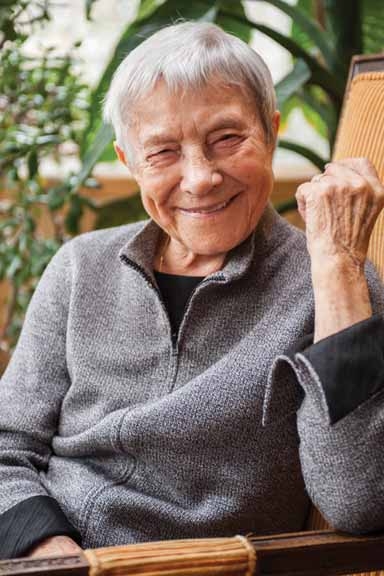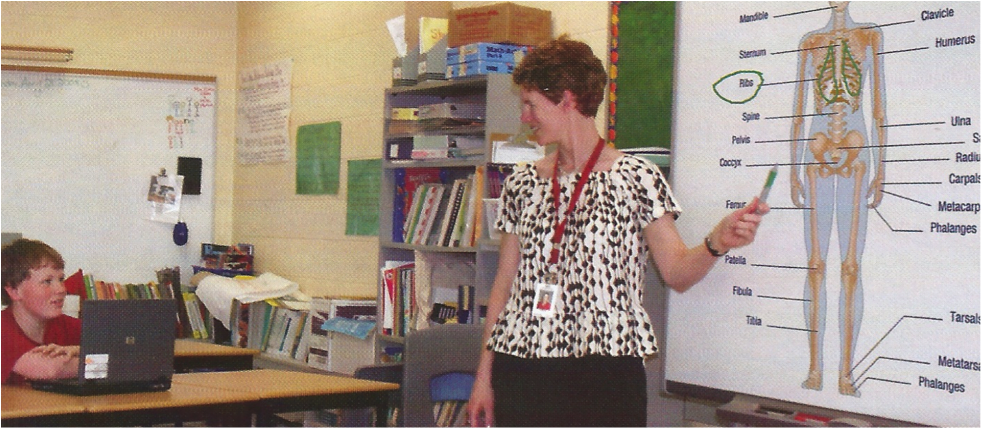
Education Series: Dr. Agatha Sidlauskas
Known simply as “Doc,” Dr. Sidlauskas’ lifelong dedication to child development in North America and Europe culminated in her founding the Venta Preparatory School in 1981. Located a five-minute drive from Kanata, Venta specializes in drawing out the potential of gifted children. While most students are from Ottawa, the day and boarding school has attracted students from Bermuda, Hong Kong, Africa, Mexico and England to profit from Doc’s unique teaching philosophy.
Venta’s guiding principle is the cre-ation of an environment where children can “reach the full unfolding of their personalities to achieve their highest academic potential.” Class sizes are capped at 12 students per teacher and music, physical education and art are required courses. Admission to the school is based on an interview with the child and his or her parents, along with a pre-admission psycho-educational assessment. Paramount to Venta’s philosophy is the uniqueness of every child. Or as Doc puts it, “the child is not rigid. The child is a special and evolving creation that changes day by day.”

Venta’s founding is the end result of Dr. Sidlauskas’ passion for child psychology, a remarkable intellect, a survivor’s spirit and a lifetime that spans World War I, The Great Depression and World War II. After almost a century of living, Dr. Sidlauskas remains fluent in Lithuanian, German, Italian and French. (She learned English when she arrived in Canada at the age of 35.) Dr. Sidlauskas reads for up to six or seven hours a day (including books in Latin) and her house – located metres away at the foot of her beloved school – is filled with hundreds of books. Neuroscience and child psychology remain her reading matter of choice. Dr. Sidlauskas’ passion for children is palpable. Upon talking about “her children” and their unique talents, Doc’s eyes light up. Her intelligent and gentle demeanour is enhanced by a translucent smile.
Agatha Elisabeth Sidlauskas was born in 1914. After graduating with a Master’s Degree in Philosophy in her native Lithuania, Doc gained a scholarship to study at the Catholic University of Milan. There she completed a PhD in Child Psychopathology. In 1939, Dr. Sidlauskas returned to Lithuania. While preparing to defend her thesis on child psychology, World War II intervened.
In 1940, the Soviet Union occupied Lithuania and Russian police rounded up and persecuted academics and other achievers. “Lithuanians were thrown into the streets. The persecution was total,” Doc recalls. She lost several members of her family in the invasion and class warfare. Caught up in the turmoil, Dr. Sidlauskas’ academic career came to a standstill and she worked as an interpreter at the Italian embassy located in the Lithuanian capital of Kaunas. Despite her relative good fortune, Doc didn’t escape unharmed. She was, as she put it, “under the eye of the Russian police.
“The idea was that I would be helpful to them. I was a very active girl as an academic in Lithuania and a good person to indicate who was where.” The Russians hoped to use her as a lure. Doc was to arrange lunch dates and other meetings with Lithuanian high flyers and snare them for the Russian police.

Under constant threat of torture, Doc was interrogated by the Russian police for three weeks, who relentlessly demanded the names and addresses of her associates. Remaining steadfast, Dr. Sidlauskas told the “biggest lies of my life,” providing her interrogators with false leads and the names of academics she knew had already been “decapitated.”
Her deception soon became apparent and her only safe option was escape. Determined to save her life, the Italian ambassador lied to the Russians, telling them Dr. Sidlauskas was an Italian national and therefore under his protection. The ambassador smuggled her into Italy, where Doc worked for several years as a consultant child psychologist and educator. Finally, a whole new chapter in Doc’s life was about to begin. In 1948, Doc became one of 165,000 refugees Canada took in after the war.
Life was still hard. Unable to speak English but fluent in French, Doc settled in Montreal where she worked for two years as a domestic. Then came her big break – a one-year honorary fellowship at the Univer-sity of Minnesota, Minneapolis. After five years, Doc was granted Canadian citizenship and she moved to Ottawa. In 1951, Doc earned an assistant professorship position at the University of Ottawa’s Faculty of Psychology and remained there until her retirement in 1979 at the age of 65. Doc held several positions at the university including full-time professor, Director of the Child Clinic Programme and Chairman of the Department of Child Psychology. Dr. Sidlauskas increased her focus on the needs of gifted children. “At that time, there was nothing for gifted children. Nothing!”
In a testament to her untiring effort, Dr. Sidlauskas received $2 million to build a child studies centre at the university. Part of the grant money was used to purchase a 50-acre rural property (now the site of Venta) used for the summer program of the University of Ottawa Child Study Centre from 1958 to 1979. Doc later converted the property to found Venta Preparatory School.

From 14 students in the 1980s, Venta now has students from junior kindergarten to Grade Six and a complement of full-time staff. Despite retiring as Director of Venta in 1993 at the age of 80, Dr. Sidlauskas remains active as the school’s clinical director and as its driving force. She remains committed to her students whom she calls “my children.”
“Children are special creatures,” says Doc. “Because of this, the educational environment needs to be developed for the child and not the other way around with the child having to develop according to the educational environment.” Under Doc’s caring influence and guidance, children in Canada and beyond its borders are set to thrive for many years to come.













